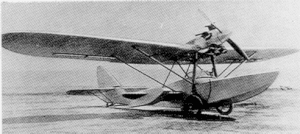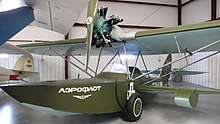Shavrov Sh-2
Shavrov Sh-2 was a 1930s amphibian design and the first Soviet mass-produced flying boat. The small, wooden aircraft was a further development of the Sh-1, with a more powerful engine and increased size.
| Sh-2 | |
|---|---|
 | |
| Role | Amphibian aircraft |
| Manufacturer | Shavrov |
| Designer | Shavrov |
| First flight | 11 November 1930 |
| Introduction | 1933 |
| Retired | 1964 |
| Status | Almost no flying examples left |
| Produced | 1934-1936, 1939-1950(?) |
| Number built | 700+ |
The Sh-2 could carry two crew members as well as one passenger and during wintertime, the aircraft could be equipped with skis. The small lower wing served as attachment for the stabilizing floats. It was a light, simple and reliable design.
Design and development
The Shavrov Sh-2 was developed from the small amphibian Sh-1 prototype design and performed its first flight on November 11, 1930. The Sh-2 passed State Acceptance trials on June 12–17, 1934, without problems. Series productions was initiated on 1 April 1934, and ended two years later. However, due to its successful design and the popularity among its pilots, production was restarted in 1939. Total production was up to at least 700 aircraft, several hundred of those being built after 1939.[1]
The aircraft was in service until 1964 and set a number of records among flying boats and seaplanes.
On 28 August 1942, the Finns captured two Sh-2s and pressed them into service in the liaison role, as well as carrying the Commander of the Finnish Air Force, until 1944.[2]
Variants
- Sh-1
- small amphibian prototype
- Sh-2
- main production variant, used in the utility transport, liaison, trainer, fishery protection and frontier patrol roles
- Sh-2S
- ambulance version, 16 built
- Sh-2bis
- version with glazed crew cabin and M-11L-engines
Specifications Shavrov Sh-2

Data from Backwoods Landing Strip - Finnish Air Force aircraft[2]
General characteristics
- Crew: 1
- Capacity: 2 pax (air ambulance version with stretcher compartment behind seats, covered with clear canopy) / 257 kg (567 lb) payload
- Length: 8.2 m (26 ft 11 in)
- Upper wingspan: 13 m (42 ft 8 in)
- Lower wingspan: 5.4 m (17 ft 9 in)
- Height: 2.8 m (9 ft 2 in)
- Wing area: 24.75 m2 (266.4 sq ft)
- Empty weight: 680 kg (1,499 lb)
- Max takeoff weight: 937 kg (2,066 lb)
- Powerplant: 1 × Shvetsov M-11A 5-cylinder air-cooled radial piston engine, 75 kW (101 hp)
- Propellers: 2-bladed fixed-pitch propeller
Performance
- Maximum speed: 140 km/h (87 mph, 76 kn)
- Range: 400 km (250 mi, 220 nmi)
- Service ceiling: 3,500 m (11,500 ft)
References
- Gunston, Bill (1995). The Osprey Encyclopedia of Russian Aircraft from 1875 - 1995. Osprey Aerospace. ISBN 1-85532-405-9.
- Perttula, Pentti. "Shavrov Sh-2". Retrieved 2009-06-27.
Further reading
| Wikimedia Commons has media related to Shavrov Sh-2. |
- De Michelis, Bruno. "The Russian Aero-marine from 1910 to 2001".